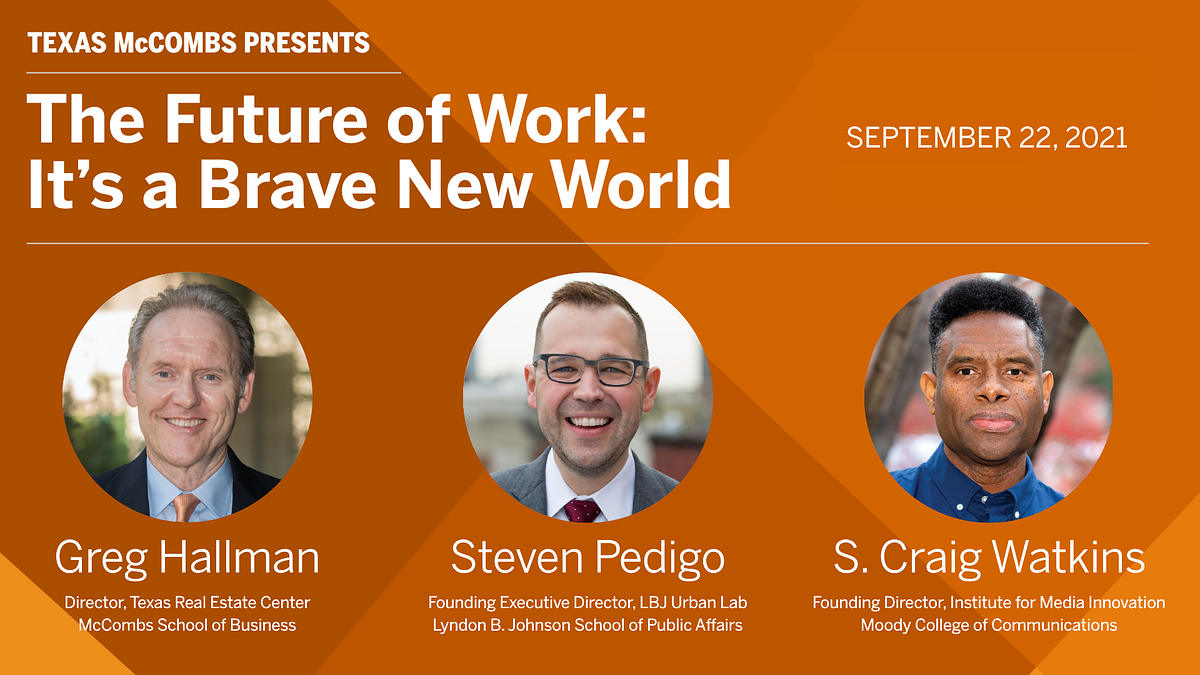The Future of Work
Experts say the pandemic has brought permanent changes where and how we work, from technology to women in the workplace

By Sharon Jayson
For those who have worked remotely since March 2020, that routine may linger as a remnant of the global pandemic. But almost two years later, whether some employees continue to work from home while others return in person — or there’s a mix of both — is still uncertain.
As companies piece together new policies for post-pandemic worklife, faculty experts at the McCombs School of Business and The University of Texas at Austin offered their take on what’s ahead at a virtual seminar, “The Future of Work: It’s a Brave New World,” presented Sept. 22 by Texas McCombs.
“There’s a growing consensus that remote work is likely to be a permanent fixture moving forward,” says S. Craig Watkins, founding director of the Institute for Media Innovation (IMI), a research and design center at UT Austin’s Moody College of Communication.
“In other words, the idea that 100% of an organization’s employees are coming into the office five days a week — those days are likely gone — certainly for the not-too-distant future, if not forever. What we’re likely to see is a hybrid model,” he says.
Watkins joined Greg Hallman, director of the Texas Real Estate Center, and Steven Pedigo, founding executive director of the LBJ Urban Lab at the Lyndon B. Johnson School of Public Affairs, for the 45-minute online program to ponder the challenges and opportunities to rethink work in the pandemic’s wake.
“The future of work is very much on the mind of real estate investments,” says Hallman, faculty director of the McCombs Real Estate Investment Fund, a student-run investment fund. “When the economy goes through a shock like we’ve been through and people rearrange how they work and live, we’re going to see the effect of that in real estate property values.”
Although he says the overall property market is up 10% from pre-COVID levels, some sectors fare better than others, with the office sector down 7% and hotels down 4%. Malls were already struggling and the pandemic dealt them “a body blow.” On the flip side, Hallman says industrial assets, such as warehouses, are up 41% from pre-pandemic levels.
“There’s certainly a connection between the pain we see in the malls and the gain we see in the warehouses,” he says. “That’s Amazon. That’s the effect of all this online shopping.”
Pedigo advises cities and other entities how to build more creative, innovative, and inclusive communities. Positives resulting from the pandemic include changing economic development for towns that couldn’t compete before.
“You look at places like Tulsa. Places like northwest Arkansas and other places across the country have really put a bear hug around this idea of remote work. ‘Come be a remote worker from our town. We’re going to create this great environment for you. We’re going to give you a little cash to come do it.’ It’s given a spark to some of the cities … and really kind of put themselves on a map,” Pedigo says. “Frankly, for places that are some of those second- or third-tier cities, we could argue that remote work may be one of the few talent lifelines that they had.”
But Watkins worries that remote work may create two tiers of employees over what some term a “proximity bias” for those who work at the office.
“What I mean by that is the idea that remote workers — compared to in-person workers — may face certain disadvantages,” he says, including perceptions that they’re less engaged and are less accessible than those who work on-site.
Watkins’ research focuses on how technology impacts the future of work and how social justice and technology intersect. He says the pandemic has exposed inequities in our economy, such as how it’s hit women hardest and left them out of the workforce longer.
Among other insights:
Millennials and Gen Z have a different expectation about what their life and work is going to be.
Hallman: “Our expectation was 8–5, five days a week, two weeks of vacation. That’s it. But we don’t see that anymore. Maybe this remote work will allow us to meet in the middle.”
The pandemic has raised this question about the human infrastructure that’s in place.
Pedigo: “We finally realized that our childcare system in this country is broken. It’s not necessarily something that just the private sector can fix with the market. The policymakers are actually going to have to play an important role if we really are truly genuine about trying to close these gaps.
People are reevaluating their career choices.
Watkins: “More and more people — as they think about their lives and quality of life in the context of the pandemic and the context of greater social isolation — opted to pursue career pathways that bring them more fulfillment and more personal rewards.
Watch the full video below:
About this Post
Share:


